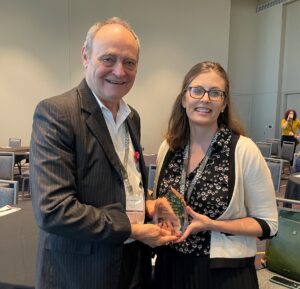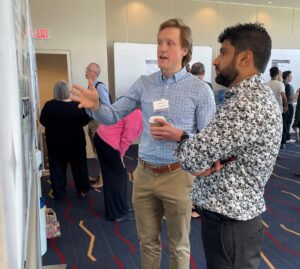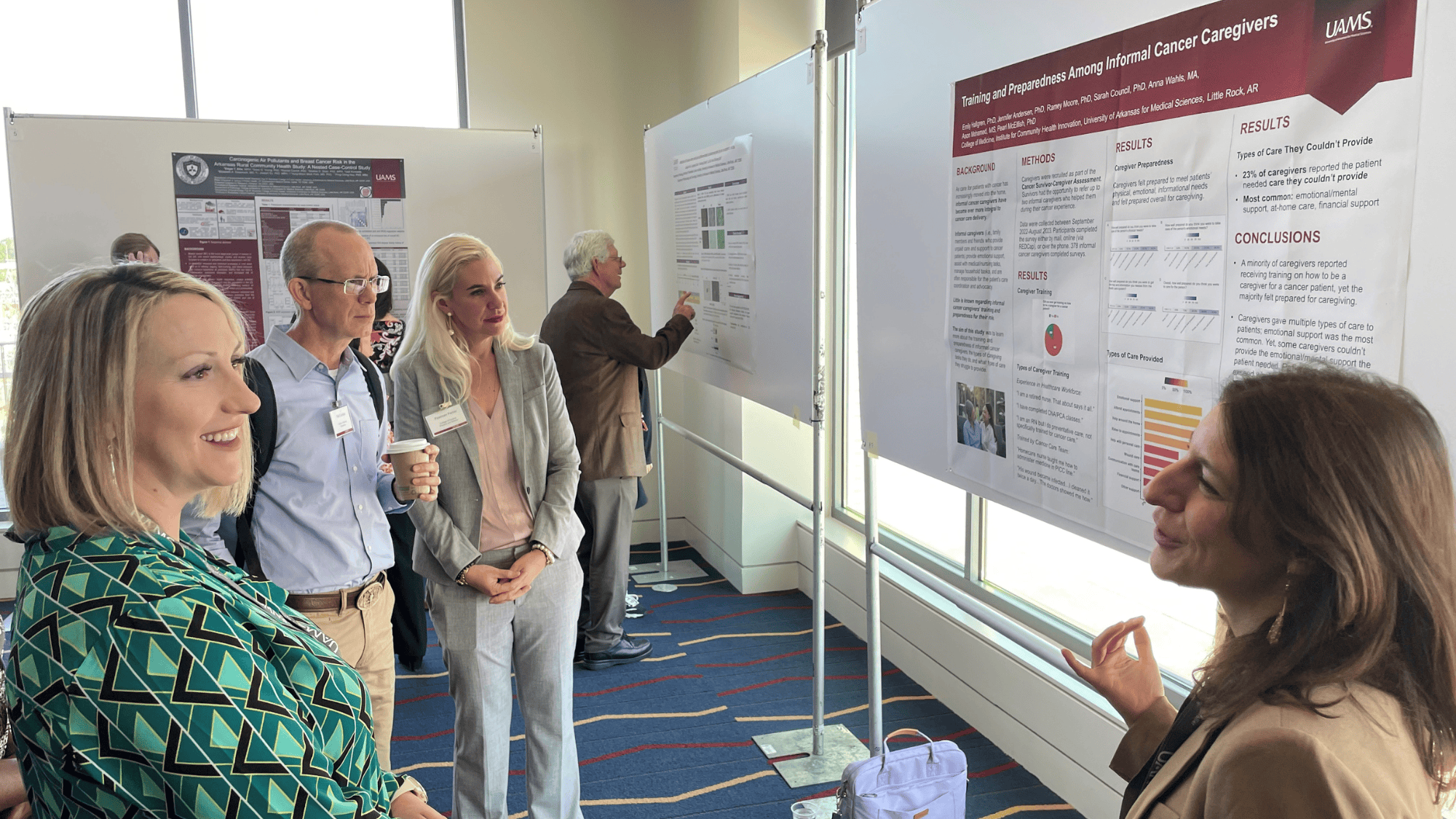Cancer Institute Research Retreat Focuses on Prevention, Early Detection
| The third UAMS Winthrop P. Rockefeller Cancer Institute Cancer Research Retreat brought together more than 250 UAMS cancer researchers and faculty to share ongoing research on the prevention and early detection of cancer in Arkansas.
An alarming statistic prompted the retreat’s prevention and early detection focus in the hopes that collaboration and sharing innovative strategies can help save the lives of the 17,000 Arkansans expected to be diagnosed with cancer this year.
“Prevention and early detection stand as twin pillars in the fight against cancer,” said UAMS Chancellor Cam Patterson, M.D., MBA, in his opening remarks at the May 15 event held at Little Rock’s Robinson Center Grand Ballroom. “They represent not only our best chance at reducing the burden of disease but also our commitment to enhancing the quality of life for individuals and communities.
“Yet our journey toward effective prevention and early detection is not without its challenges. It demands a nuanced understanding of the unique needs and circumstances facing our communities, as well as a commitment to addressing the systemic barriers that hinder access
to care.
“Prevention and early detection are critical components of the NCI designation grant,” said Michael Birrer, M.D., Ph.D., director of the Winthrop P. Rockefeller Cancer Institute and UAMS vice chancellor. “They are also the most important areas that a cancer center should focus on that are most relevant to the population it serves.
“The saying, ‘an ounce of prevention is worth a pound of cure,’ is particularly true in cancer,” added Birrer. “We have an unacceptably high burden of cancer in Arkansas that requires us to research deeply what risk factors and implementation strategies can help us mitigate its onset.”

Director Michael Birrer, M.D., Ph.D., presents the Director’s Spotlight Award to Taren Swindle, Ph.D.
A highlight of the retreat was the Winthrop P. Rockefeller Cancer Institute Director’s Spotlight presentation by Taren Swindle, Ph.D., entitled “Application of Implementation Science to Advance Cancer Prevention.” Swindle, an associate professor in the UAMS College of Medicine Department of Family and Preventive Medicine, shared her NCI-funded research that focuses on understanding and improving nutrition and activity patterns for those affected by poverty, particularly children and those living in rural and under-resourced areas of Arkansas.
The retreat also featured nationally renowned speakers, including keynote speaker Steven K. Clinton, M.D., Ph.D., from The Ohio State University Comprehensive Cancer Center. He spoke on “Diet, Nutrition and Cancer: Strategies for the Future.”
“What we understand is that food affects cancer in the same way that smoking affects lung cancer,” said Clinton during his address to an audience that also included leaders from the Arkansas Research Alliance, Arkansas Children’s Research Institute and the Arkansas Department of Health.
“The plenary lecture on nutrition was fascinating and addressed a topic that is important to all of us,” said Marjan Boerma, Ph.D., associate director of basic science for the Winthrop P. Rockefeller Cancer Institute and professor of pharmaceutical sciences in the UAMS College of Pharmacy.
This year’s retreat included diverse presentations on catchment area needs, tobacco use, environmental causes of cancer, cancer research training and education, cancer navigation and community outreach and engagement, cancer imaging informatics, global proteomics, and population science.
In a panel discussion on catchment area needs, Pete DelNero, Ph.D., explained that “catchment refers to that extent the people who come into our clinics reflect the state’s population. We are responsible for the people who come to us but also the people who live next door. NCI expects designated cancer centers to take an active role in reducing risk and eliminating disparities, regardless of where they go for treatment.”
DelNero is an assistant professor in the UAMS Division of Community Health and Research and studies the relationship between the Cancer Institute and the catchment area population, which is the state of Arkansas, so that the research is meaningful to Arkansans.
 In between presentations, researchers had the opportunity to showcase their work and review their colleagues’ work during three one-hour poster sessions that featured more than 70 posters of active cancer research projects.
In between presentations, researchers had the opportunity to showcase their work and review their colleagues’ work during three one-hour poster sessions that featured more than 70 posters of active cancer research projects.
“The retreat was an exciting opportunity for me to meet all layers of the Cancer Institute and hear firsthand about the cutting-edge research we are all moving forward,” said Sean Taverna, Ph.D., dean of the UAMS Graduate School. “I was even able to discuss a few potential collaborations during the poster sessions.”
“It’s great to see so much interest in this topic,” said Birrer of the record attendance at the event. “I think we are also effectively building this cancer center and making improvements on multiple levels that everyone is excited about.”
Since May 2020, the Cancer Institute has recruited 24 new faculty researchers with more than $13 million in grant funding. UAMS researchers have received more than $15 million in additional NCI funding since February.
The Winthrop P. Rockefeller Cancer Institute operates three formal research programs: Cancer Biology, Cancer Therapeutics, and Cancer Prevention and Population Science. More than 170 UAMS faculty and physician scientists are members of one of these programs and conduct active cancer research studies.
